In this episode, Dr. Ron sits down with Mike Shaw, our resident cardiovascular health and anti-aging specialist. They discuss the importance of vascular health as we age and ways to keep our cardiovascular system young.
To learn more about the PhysioAge program discussed in this episode, visit: https://riordanclinic.org/what-we-do/physioage/
Mike Shaw is currently accepting new patients. To book an appointment with Mike, Call 1-800-447-7276
Thank You to This Episode’s Sponsor
Episode Transcripts
Disclaimer: The information contained on the Real Health Podcast. And the resources mentioned are for educational purposes only. They are not intended as, and shall not be understood or construed as medical or health advice. The information contained on this podcast is not a substitute for medical or health advice from a professional who is aware of the facts and circumstances of your individual situation. Information provided by hosts and guests on the Real Health Podcast or the use of any products or services mentioned does not create a practitioner patient relationship between you and any persons affiliated with this podcast.
Dr. Ron Hunninghake: So welcome everyone. This is Dr. Ron Hunninghake with another episode of Real Health and we’re at the Riordan Clinic. And it’s my pleasure today to have Mike Shaw with us. And we’re going to be talking about vascular health as you age. And so, Mike welcome.
Mike Shaw: Thank you. I’m glad to be here.
Dr. Ron Hunninghake: Yeah. Mike is really the right guy to help us investigate this topic. Mike is now working as a physician here at the Riordan Clinic, but he’s got 30 years working with a well-known cardiologist here in Wichita is now retired. And so we were able to snag Mike and I was especially interested in the fact that during his tenure in cardiology, he had a parallel track with anti-aging medicine. So can you just kind of, let’s just start with that because that’s what we want to get into is anti-aging I think everyone’s interested in that.
Mike Shaw: Yeah. I actually joined this cardiology group and in 1994 and the next year in 1995, I went to this world conference and it was an academy called the American Academy of Anti-Aging. So they abbreviated it A4M
Dr. Ron Hunninghake: Yeah, A4M is very well known and very well attended.
Mike Shaw: I’ve been to every conference every year, except for the founding year. Of course, I didn’t even know about it then.
Dr. Ron Hunninghake: So, well, we want to kind of focus our attention today on the vascular system, our arteries. And there’s a very famous quote that a man or woman is only as old as his or her arteries. Have you heard that before?
Mike Shaw: Yes, I have.
Dr. Ron Hunninghake: So what does that mean? Why, why are our arteries so important to us in terms of aging?
Mike Shaw: Well for one, they’re the main conduit for the delivery of oxygen, getting rid of carbon dioxide, supplying all nutrients throughout the body, but additionally, how healthy the vascular system ends up having a fairly profound effect on all organ systems, because as changes in pressures occur, it does damage. And pulsatile wave forms that change from youth to more aged states caused damage on tissues of different organ systems, especially the brain, the kidneys and the heart.
Dr. Ron Hunninghake: Yeah. So everyone’s aware that hypertension untreated can have you know, serious health consequences, and I guess in real simple terms, as the arteries age, they become stiffer. And so when the heart beats the, the pulse of blood into the arterial system, when the arteries can’t expand, that is what shoots up that systolic blood pressure and puts pressure on your brain. It puts pressure on your kidneys, your heart. And so all those are organs that are really important to us, and they tend to give us problems as we get older. So the big question is what do we do to take better care of our arteries?
Mike Shaw: Well, you know, one of the reasons when I got involved in the anti-aging and the American Academy of Anti-Aging medicine is that I, I met a physician that had developed a system called PhysioAge. That was a way to evaluate and analyze the rate of aging in an individual person. And one of the six major biomarkers was looking at vascular age or what they call cardio age with sophisticated equipment that can evaluate the pulsatile pressure changes when the left ventricle contracts and squeezes a volume of blood out through the aorta and downstream. So, I like looking at that and because you can start early, especially, I’ve told people before, you know, if, if people would do some kind of a footprint like this cardio or Physioage analysis, when they’re in their twenties or thirties, that to me is kind of like a baseline. And then you have a point to see how well you do as chronological time moves forward. And of course the whole game is how can we keep the physiologic range of aging behind the chronological advancement of time?
Dr. Ron Hunninghake: Yeah, we’re all going to get older, whether we like it or not, but if we can keep our organs aging at a slower rate than what our time is, then that’s the name of the game. I wanted to let everyone know that the original name of the Riordan clinic was the center for the improvement of human functioning. And so Dr. Riordan was one of the early functional medicine doctors, and his premise was you can’t manage what you don’t measure. And every good cardiologist knows. If you’re going to ma manage hypertension, you can’t do it unless you pretty regularly check the blood pressure. And then based upon the readings that you get, then you make your interventions. And so in many ways, what you’re saying here that the cardio Physioage is something, if it could be measured at first early on to get a good foundation, and then periodically during a person’s life, if the changes were occurring too fast, we could make an intervention, do something to slow down the rate of deterioration.
Mike Shaw: And we could, we could evaluate whether our intervention was effective or not, because if it is effective, you should see a reversal in the trend on those wave forms that are becoming negative because rigidity and resistance is increasing in the vascular tree.
Dr. Ron Hunninghake: Okay, well, now we come to the hard part of the presentation. I agreed, I have gone through the Physio age and I think my first go through was what was it about, oh, how long ago was about two and a half, three years ago. And, I was a little above where I was supposed to be in my cardio age. This, this is my first measurement. And so you gave me some homework, some phytonutrient type supplements to take. And so before we go further on this, tell them a little bit about how certain plant-based supplements can have a bearing on the elasticity of your heart.
Mike Shaw: Yeah, I’ll talk about that, but I will talk about maybe one other thing. Your body has innately inside of it in youth, a very potent vasodilator. In fact, the most potent vasodilator in the body is called nitric oxide. And it is responsible for the relaxation and dilatation and low pressure of flow, increased perfusion, distribution of nutrients, elimination of waste products. And as we age, unfortunately, nitric oxide, like a lot of other things inside the body declines. So, looking at when you’re doing some of these, like this, these sphygmomanometer measurements, and you’re seeing increased resistances and pressures and changes in wave forms, taking a look at what’s going on with nitric oxide is kind of important.
Advertisement: There’s a lot more to this conversation and it’s coming up right after the break.
Today’s episode of the Real Health Podcast is brought to you by the Riordan Clinic Nutrient Store. The Nutrient Store is your resource for the highest quality nutritional supplements. Every supplement in the store is handpicked by the expert medical staff at Riordan Clinic, providing you with the best quality, purity, consistency and effective dosing available. Visit store.Riordanclinic.org to shop online.
Dr. Ron Hunninghake: You know, and there’s another side story to this back when I was doing this, my wife informed me that I was a pretty bad snoring sleeping partner. And I have since done some things to make a difference there, but when you don’t breathe properly at night, you can’t make nitric oxide like you’re supposed to. So one of the main reasons people should get their sleep studies done is to make sure that they maintain a good airway so that they can make nitric oxide and that will help them to protect their heart and their blood vessels. But you can also do nitric oxide supplements, which is one of the things you recommended to me.
Mike Shaw: Yeah. there is a company that makes a beet based product that’s very high in nitrate and the body takes nitrate and makes the kind of final conversion to nitrate, and then that goes into nitric oxide. Yeah. And we, we knew lose the nitrate track earlier on. It was supposed to come through the dietary side and that kind of gets disgruntled in this route.
Not everyone loves beets. And so a lot of people do, so that’s a good way to go. But then the nice thing about those lozenges is they taste good. And what do you suggest one or two a day?
Mike Shaw: Usually I do at least two for the first month. And then if you want, you can back off to one a day.
Dr. Ron Hunninghake: And it’s not just individual supplements. I think people, if they’re eating a lot of colorful plant-based foods, there are phytonutrients in those foods that are great antioxidants. You know, oxidation means stiffening and that the arteries become oxidized they stiffen. And that’s part of this too. And a lot of these other supplements, like the arteriosil that we use, but you look at the list of phytonutrients there. There’s just a, there’s a ton of really great phytonutrients.
Mike Shaw: This, this particular company did a lot of work on the endothelial lining of, of the vascular tree. And as they’re the ones that came up with this one cell lining that’s on the exterior of the arterial wall that protects the endothelium from an adhesion of pretty much everything that flows through the bloodstream. And when that one celled lining gets disrupted and broken through, then things that your body has to have, like cholesterol that’s made out to be the enemy, but your body uses it for a lot of other healthy purposes. Cholesterol and iron and white cells and calcium and all this stuff that’s flowing through. You, you lose that protective coating and all of a sudden adhesion and buildup of these materials can start to narrow it down.
Dr. Ron Hunninghake: Or where you end up getting plaque in your coronary arteries. And it can cause a heart attack.
Mike Shaw: That’s exactly right.
Dr. Ron Hunninghake: Yeah. Here at the Riordan Clinic I didn’t remember this until just before our discussion today, Dr. Riordan’s son, Neil Riordan, did research here on some plant-based products that he found stimulated the production of what’s called endothelial stem cells. And so these are stem cells that go in and help do repairs on the endothelial lining of the arteries. And so he’s got some pretty good research that this is another helpful way to take care of that endothelium.
Mike Shaw: Absolutely.
Dr. Ron Hunninghake: So what really, we’ve got a lot f, of we’ve got a lot of things we can do to take care of our health. And we haven’t even talked about some other basics, like exercise, exercise, maintain circulation. What’s the latest thinking on, on exercise in terms of maintaining healthy heart.
Mike Shaw: I think the current thing thinking as is most days of the week, try to pick some kind of activity that gets you out and your respiratory system and your cardiovascular system working at a little bit more than just idle. Yeah. I’m not saying it has to, you know, be long distance endurance training, but more and more activity on most days of the week in some form.
Dr. Ron Hunninghake: Yeah. The the latest thing is what’s called interval training where you, if you’re going to go walking, pick up your pace and walk a little faster for a minute and then slow back down again and do three, four of those intervals while you’re walking or running or whatever you’re doing, it seems to stimulate the mitochondria, which are the powerhouses of your cells.
Mike Shaw: You know, one other thing I was going to mention is that when we talk about change in vascular structure and elasticity, or becoming more rigid, we don’t want to forget about the interplay with inflammatory response inside the body and the effect that has on the whole vascular system. Well, all organ systems, but when, when you start to generate such inflammatory drive in the vascular system, that’s a part of the degrading process of the protective linings and a change in the elasticity, more towards rigidity. So I’m a big proponent of looking at natural ways to try to help lower inflammatory response in the body. And one of the easiest, unless you’re allergic to fish, is omega-3 fatty acids because they have a fairly impressive response on lowering inflammation in the body. Pretty much all kinds of levels.
Dr. Ron Hunninghake: Well, and it reminds me too, that the basic evaluation we do on most of our new patients is the Real Health Discovery Profile. That’s got a load of different ways to assess your inflammatory state, such as the C reactive protein, even something like the vitamin D level. Having a good vitamin D is anti-inflammatory to your body. And so again, we and Dr. Riordan and myself, and I know you believe in prevention you know, an ounce of prevention is worth a pound of cure. And a lot of times people just kind of take for granted they’re okay. And hope that the bad thing doesn’t happen, but it’s always better to invest in understanding where you are now, so that you can take early intervention and prevent the bad thing down the road.
Mike Shaw: I absolutely agree. I mean, what you don’t know can hurt you.
Dr. Ron Hunninghake: It can kill you. Absolutely. Yeah. Well, I think we’ve hit a lot of the big topics, Mike. I just know it’s been great having you come and join us here at Riordan Clinic and bringing your understanding of the importance of anti-aging. So before we go, could you just tell us a little bit more about Physioage and is that something hard to get into, or is that available to anyone that’s interested in looking at their overall health age?
Mike Shaw: Yeah, I think anybody that’s interested in, like I said, creating that baseline footprint, that then becomes your mark on how things change or improve as time moves forward is a great concept. And the physio program is basically comprised of six major biomarkers, but it also includes many other testing components that are combined in with it. But the there’s four testing biomarkers, and there’s two blood biomarkers. One that looks at immune, advanced immune system function. And the other one that looks at cell aging by evaluating the length of telomeres strand on thousands and thousands of cells. The other four- one is looking at lung age or what they call Pulmo age. The other one is cardiovascular age or cardio age, and then there’s cuto age, cuto for scan. So it’s looking at the loss of elasticity using laser technology to evaluate how youthful or aged your skin is. It’s the same kind of device, a lot of cosmetic companies use to evaluate in trials the effectiveness of their products. Yeah. Because you can actually, if they did a good job with their product, you see an improvement in the youthful nature and the elasticity of the skin.
Dr. Ron Hunninghake: Absolutely. Well, I think it’s a great investment. I’ve done it twice. And I actually did lower my overall age as a result of the recommendations you made and the things that I’ve learned here, working at the Riordan Clinic. So we certainly do invite patients to give us a call if they’re interested, if they want to learn more. But Mike, once again, thank you so much for your commitment.
Mike Shaw: You’re welcome. I can’t tell you how honored I am to be a part of the staff here, and I would enjoy or entertain any calls from anyone that would like to know more about the the physio age system or aging reversal in general.
Dr. Ron Hunninghake: Very good. And once again, all you listeners, thank you for listening in. We’ve had a lot of really good feedback. People are enjoying the Real Health Podcast, and we hope that we can bring you more and better information about how you can stay well and enjoy the fullness of life. So thank you and have a great day.


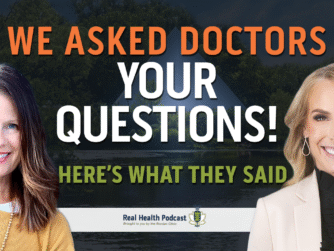
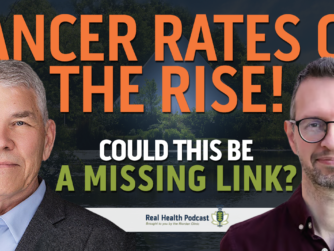
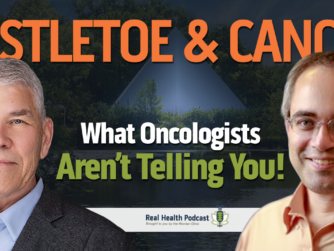
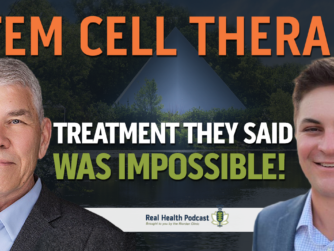
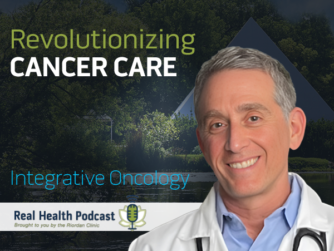
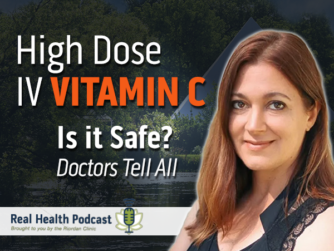
Love hearing your podcasts!!!